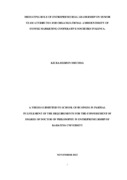| dc.description.abstract | Entrepreneurial leadership is crucial for cooperative organizations as it involves
taking risks, driving growth as it encourages creativity and innovation.
Ambidexterity refers to the ability of an organization to both exploit and explore
implying to deliver efficiency, control, and incremental improvements, while
embracing flexibility, autonomy, and experimentation. Organizational ambidexterity
has the ability of firms to pursue and synchronize exploratory and exploitative
innovation simultaneously it not only helps firms overcome structural inertia that
results from a focus on exploitation, but also refrain firms from accelerating
exploration without deriving benefits from these activities.Coffee has been an
important cash crop in Kenya’s agricultural sector. It is one of the greatest foreign
exchange earners of the country and a main source of employment in rural areas,
providing food security and income for the rural areas. This success has been
achieved through coffee cooperative societies management that process and market
coffee for the farmers. In recent years, there has been a decline in coffee production
in Kenya. The decline of coffee export earnings has been attributed to inefficient and
ineffectiveness of coffee marketing cooperative societies management operations
and therefore the need to refocus their approach. The general objective of this study
was to examine how entrepreneurial leadership mediates the relationship between
senior team attributes and organizational ambidexterity among coffee marketing
cooperative societies in Kenya. The specific objectives of the study were; to
determine how shared vision influence organizational ambidexterity, to establish
whether social integration affect organizational ambidexterity and to find out how
contingency rewards influence organizational ambidexterity of coffee marketing
cooperative societies in Kenya. The study also established the mediating role of
entrepreneurial leadership between senior team attributes and organizational
ambidexterity for coffee cooperative societies in Kenya. This study was anchored on
two major theories which were Collective Entrepreneurship Theory and Path Goal Theory
of Leadership and supported by other theories mentioned in the study. The study used
cross-sectional survey design. The target population was coffee marketing
cooperative societies registered in Kenya as at 31st December 2019. The study target
population was 436 managers from coffee marketing cooperative societies while the
sample size of this study was 242 managers. Primary data was obtained by the use of
as elf-administered semi-structured questionnaire. A pilot study was done to check
the reliability and validity of the research instrument. Data analysis was done using
descriptive and inferential statistics. The formulated hypotheses were tested using
Baron and Kenny’s approach to validate the relationships between the study
variables. Statistical Package for Social Sciences (SPSS) version 23 was used to
assist in analysis and findings were presented using cross-tabulations, charts and
path models. The study found that entrepreneurial leadership partially mediates the
relationship between senior team attributes and organization ambidexterity (R2
change from 11.1% to 16.6%). This study concludes that entrepreneurial leadership
is a critical approach for coffee marketing cooperative societies in Kenya. The
findings of the study will help managers to maximize their efficiency and achieve
their strategic goals during their operations especially when they want to
internationalize. The findings of this study will be of interest to coffee marketing
cooperative society’s board of directors, government officials, academia, financial
institutions and agropreneurs. | en_US |
